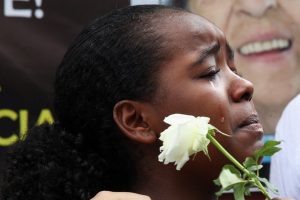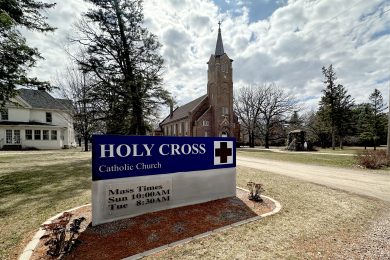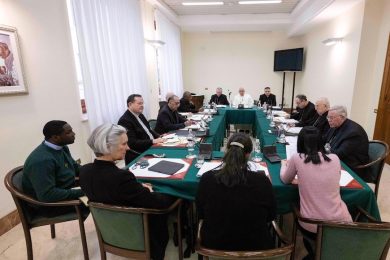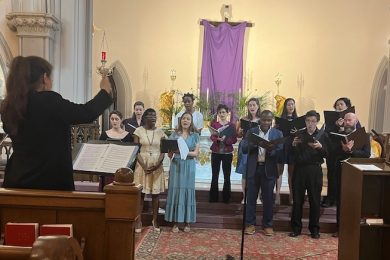By Eduardo Campos Lima | OSV News
SÃO PAULO (OSV News) — On the same day that a 28-year-old woman broke into a school in Nashville, Tennessee, and shot six people dead, a 13-year-old student in São Paulo — Brazil’s financial hub and largest city — fatally stabbed a teacher and wounded five other people in his school.
The assault that took the life of a 71-year-old Biology teacher Elizabeth Tenreiro March 27 was the second school attack in the South American country in 2023.
While compared to the 89 gun-related incidents that have happened in educational institutions in the United States so far this year, two attacks seem a low number. But Brazilian analysts warn that there is an ongoing surge of occurrences of that nature.
A study recently released by researchers of the State University of Campinas (known in Brazil as Unicamp) demonstrated that there were 23 school attacks between 2002 and 2023 in the country, and nine of them happened since August 2022.
The emergency has urged Catholic educators to reflect on its causes and to discuss ways of interrupting the cycle of violence in schools.
“The COVID-19 pandemic intensified emotions like hatred, anguish, uncertainty, and loneliness. When the students came back to school, we felt that those unprocessed feelings led to more aggressiveness,” Ascânio Sedrez, educational director of the Cabrini sisters’ Boni Consilii School, in São Paulo, and a member of the National Association of Catholic Education (ANEC), told OSV News.
While the crisis of violence has exploded with the pandemic, its roots are connected to broader social problems, Sedrez said.
“Children are growing up alone and many times without proper adult role models. The internet gives them plenty of information, but nobody discusses existential issues with them,’ he said.
Sedrez stressed that teenagers are more vulnerable to hate speech. Misogyny, racism and homophobia are common traits among the attackers, according to the Unicamp study.

“Over the past few years, Brazilian society has seen a growing dissemination of violent ideas, and they can have a direct influence on reality,” Sedrez said, mentioning former President Jair Bolsonaro’s policies to loosen gun control, which led to more shooting ranges and weapons around the nation.
Violence in society has direct implications for the schools’ communities, argued Ricardo Spindola Mariz, educational director of the Marist schools in Brazil.
“The school is naturally a place of conflict, given that it is part of the educational process. But lately conflict has turned into confrontation. We need to find better ways to deal with it,” Spindola Mariz told OSV News.
Many times, schools fail to listen to the students’ needs and downplay their emotional distress, something that is an act of institutional violence, Mariz argued.
“We need to look inside and see how we are contributing to increasing violence in society and in schools,” he said.
Catholic schools in Brazil are private and enroll 2.7 million students, a small share of the nation’s total number of 46.6 million students. Mariz said the Catholic schools must get more involved in the nation’s education issues.
Most government-run schools suffer from a lack of infrastructure and their teachers are poorly paid. Attacks like the one on Monday usually occur in public schools.
“Running good Catholic schools is not enough. We need to ask ourselves how the public schools near the Catholic ones are benefitted by them,” he said.
Teacher training activities held by Catholic schools could be extended to public school teachers, for example.
“We need outbound Catholic schools — the same way that, according to Pope Francis, we need an outbound church,” Mariz argued.
According to Father Evandro Alves Bastos, a teacher and university pastoral leader who advises the Education Pastoral Ministry in Minas Gerais state, the Brazilian church has been increasing its presence in school communities.
“We are building an active presence, opening our parishes’ spaces for the schools and organizing activities with students and teachers in order to listen to their issues and promote mental health,” Bastos told OSV News.
The focus of the church’s work is to “take the children and teenagers out of the universe of violence and allow them to dream about a better world,” he said.
Shortly after the attack, Archbishop Walmor Oliveira de Azevedo of Belo Horizonte, who heads the Brazilian bishops’ conference, released a statement lamenting teacher Tenreiro’s killing and manifesting solidarity with her school community. He said that “violence is not combated with weapons, but by establishing a counterpoint to the banalization of life.”
Sedrez agrees with that opinion. For him, preventing new attacks and killings in schools does not involve “increasing security measures, like implanting metal detectors.”
“That kind of measure is highly ineffective. The only way to work on the humanization of the whole school community is by establishing deep human relations based on dialogue. There is no other way.”






















